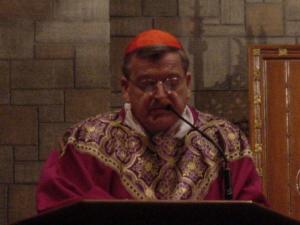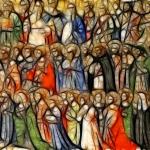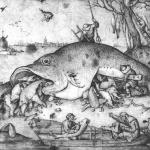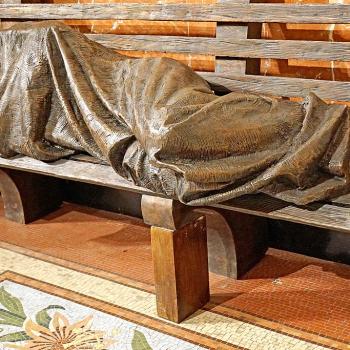
Cardinal Burke, once again promoting an alt-right ideology which counters the Christian faith, called for limiting Muslim immigrants into the United States, saying such would be patriotic. Without a sense of irony, he gave this statement at a so-called “Pro-Life” March in Rome on May 17, 2019, demonstrating that his position is hostile to the dignity of all humanity, thinking that preference can and should be given to some over others according to one’s religion (or lack thereof). Such a denunciation of religious liberty denies both Catholic teaching, and the historical position of the Founding Fathers of the United States as well.
Catholic teaching is simple: religious liberty should be given to all. No one should be discriminated against because of their religion. This was made abundantly clear in Nosta Aetate:
We cannot truly call on God, the Father of all, if we refuse to treat in a brotherly way any man, created as he is in the image of God. Man’s relation to God the Father and his relation to men his brothers are so linked together that Scripture says: “He who does not love does not know God” (1 John 4:8).
No foundation therefore remains for any theory or practice that leads to discrimination between man and man or people and people, so far as their human dignity and the rights flowing from it are concerned.
The Church reproves, as foreign to the mind of Christ, any discrimination against men or harassment of them because of their race, color, condition of life, or religion. On the contrary, following in the footsteps of the holy Apostles Peter and Paul, this sacred synod ardently implores the Christian faithful to “maintain good fellowship among the nations” (1 Peter 2:12), and, if possible, to live for their part in peace with all men, so that they may truly be sons of the Father who is in heaven.[1]
What Cardinal Burke promotes is contrary to Catholic teaching; indeed, it has already been reproved by the church. Discriminating against immigrants on the basis of their religion is a refusal to act out of love for the other, for those who are in need. It is a rejection of the duty we have to the other because we share one commo humanity with them, one large human family with them, all because of our disagreements with their beliefs. Likewise, to reduce Muslims to extremists, as justification for this ideological move against the church’s teaching, is itself contrary to Nostra Aetate, which told Christians we must work together with Muslims, overcoming the hostilities which such propaganda has created in the past.[2] Indeed, if one reads the official declarations of the church, this description of Islam has been utterly rejected by the church, because the church knows that you do not judge a religion based upon the worst representations of that religion (otherwise the church would be judged for the evil its people commits, often by people who have tried to use religion to justify their actions).
The dignity of the human person is fundamental to the Catholic faith, and likewise, to any sound political system. When it is denied, justice is denied. Religious liberty follows from this, as Dignitatis humanae declared:
Since the common welfare of society consists in the entirety of those conditions of social life under which men enjoy the possibility of achieving their own perfection in a certain fullness of measure and also with some relative ease, it chiefly consists in the protection of the rights, and in the performance of the duties, of the human person.(4) Therefore the care of the right to religious freedom devolves upon the whole citizenry, upon social groups, upon government, and upon the Church and other religious communities, in virtue of the duty of all toward the common welfare, and in the manner proper to each.[3]
The United States, though imperfectly representing the ideals expressed in its founding documents and their authors, has had a long history of immigration, opening itself to others. The welcome placed upon the Statue of Liberty, “Give me your tired, your poor, your huddled masses yearning to breathe free,” represents the highest ideals of the American system. To be patriotic is to affirm this, not only because it represents a part of the American legacy, but because it follows through with what justice demands of any society. To be patriotic is to affirm the good within one’s own society, and to promote it: not to reject it. When Cardinal Burke calls it patriotic to reject those in need, all due to a particular religion they hold, he follows after the worst aspect of the American experience, in which each new immigrant group found itself ostracized and unjustly maligned, until a new group came in to receive a similar form of xenophobia and hate. Catholics experienced that hate, with the same kind of bitter rhetoric in the past, which is now being used against Muslims today. Burke, far from being patriotic by affirming what is good and just in American history and tradition, rejects it, and so is the one who represents an unpatriotic position as he seeks to undermine the best of the American tradition for the sake of an inhumane (and so anti-life) ideology. Alt-right nationalism which confuses patriotism for nationalism denies true patriotism, for it only supports and promotes a select group within America, rejecting and denigrating everyone else, while patriotism works to build up the common good.
Cardinal Burke is out of order, both as a Catholic, and as an American. He denounces and denies the teachings given by both the Catholic Church in his rejection of religious liberty, and in doing so, he also denies the common good which has been promoted by the best instincts of the American system. He is no patriot. He is an ideologue willing to undermine the dignity of life itself. Over fifty years ago, Vincent Price, a true patriot, spoke up at the end of an episode of The Saint on NBC radio with words must never go out of fashion:
Ladies and gentlemen, poison doesn’t always come in bottles. And it isn’t always marked with the skull and crossbones of danger. Poison can take the form of words and phrases and acts: the venom of racial and religious hatred. Here in the United States, perhaps more than ever before, we must learn to recognize the poison of prejudice and to discover the antidote to its dangerous effects. Evidences of racial and religious hatred in our country place a potent weapon in the hands of our enemies, providing them with the ammunition of criticism. Moreover, group hatred menaces the entire fabric of democratic life. As for the antidote: you can fight prejudice, first by recognizing it for what it is, and second by actively accepting or rejecting people on their individual worth, and by speaking up against prejudice and for understanding. Remember, freedom and prejudice can’t exist side by side. If you choose freedom, fight prejudice.[4]
Vincent Price offered words which are one with Catholic teaching, and the best of America’s ideals. These words, instead those spoken by Burke, are what we need today. Let us be true Christians and patriots and reject religious discrimination wherever it is found.
[1] Nostra Aetate, Vatican Translation.¶5.
[2] Nostra Aetate, Vatican Translation.¶3.
[3] Dignitatis humanae. Vatican translation. ¶6.
[4] Quoted from Dangerous Minds “Vincent Price Has Some Thoughts on Racial Prejudice and Religious Hatred,” (03-20-2015).
Stay in touch! Like A Little Bit of Nothing on Facebook.
If you have liked what you read, please consider sharing it with your friends and family!













